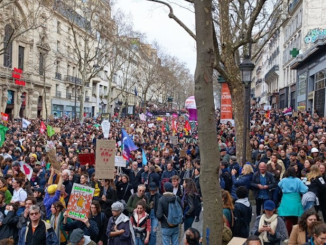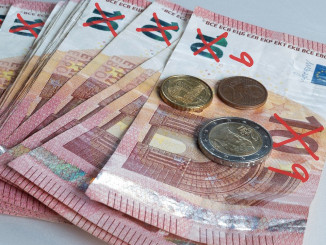This article has been translated from French.
The presidential elections will take place on April 10 and 24. There are twelve candidates in the running. Twelve? Yes, it is a tradition in France to have many candidates competing in the elections, even if they have no chance to be elected. The barrier to running is to collect 500 sponsorships from mayors, deputies or senators. This is not easy for “small” candidates. Running for office is a way to take advantage of the media and public interest in this very political moment. This is why revolutionaries regularly run in elections, especially presidential ones, as these are the ones that interest the most people, and have the lowest abstention rate – usually only 20% of voters do not vote. However, it seems that this time there will be more abstentionists.
This election is a bit special for several reasons: on the one hand, the traditional parties that alternate in the government (PS – the Socialist Party, and LR – the Republicans who are the traditional party of the right), are no longer predominant. For example, the PS, which was still in government from 2012 to 2017, with François Hollande, is getting only 2.2% in the polls! For its part, the major party of the right, LR, which was in government before Hollande, is getting only 10% of the voters’ support.
This can be explained by the phenomenon of the current president, Macron, who claims to be neither of the right nor the left, but who is in fact on the right and very right-wing! To win that last election he managed to attract part of the votes of the left (he was formerly in the Socialist Party, and one of Hollande’s ministers), and of a part of the right’s as well. As of the time of this writing he is polling at around 27%, and he’s on a downward slope since he put forward his anti-social program: pushing back the retirement age to 65, instead of 62, reducing social benefits, etc.
Another characteristic of this election is the existence of two candidates on the far-right, Marine Le Pen (Rassemblement National) and Eric Zemmour, (Reconquête). Between them they have the support of around 30% of prospective voters. The new guy is Eric Zemmour, a pundit who was launched by TV, first on public television, then on Bolloré’s channel. Bolloré is a big French capitalist and a Catholic fundamentalist, who made his fortune in Africa. He bought many media companies in recent years (television channels, a radio network, and newspapers), and gave them a very right-wing, racist, anti-Muslim, misogynistic orientation. Zemmour is the perfect prototype of this political trend. As he became known through TV, he made a splash in the polls and rose quite high when he declared his candidacy. Then he lost support after the beginning of the war in Ukraine, when he said that we should not welcome Ukrainian refugees…
There are two rounds in the presidential elections: on April 10 people vote for the candidate of their choice among the twelve and the two who do best remain in the second round, on April 24. In the last presidential elections, there was a Macron-Le Pen duel, and many people voted for Macron to prevent the far right from coming to power. This time, it’s a little different: not all left-wing people will vote for Macron because they have had the experience of his very right-wing policies. As a result, as Macron is falling in the polls (he went from 31% to 27% in a few weeks). This is starting to scare the government, because at the same time, Le Pen is rising a lot (from 16% to 20%). She is taking advantage of Zemmour’s candidacy to appear more moderate, and also of Macron’s speaking out against pensions and the current retirement age to position herself as the spokesperson of the working classes against the elites.
Finally, the left is dispersed with four candidates: the SP, the Greens, the Communist Party and Mélenchon. The latter is a former socialist who embodies the more radical social democratic left. He has also been rising in the polls for several weeks (from 9% to 15%). It is possible that the left-wing voters will vote massively for him, supporting the lesser evil, and he hopes to reach the second round.
There are also two far-left candidates, Nathalie Arthaud of Lutte Ouvrière (Workers’ Struggle), and Philippe Poutou, for the New Anticapitalist Party (NPA). Their meetings attract many young people who are revolted by the situation and very worried about their future. But there is little chance that this will be reflected in the results, as they both poll at around 1%.
The configuration of these elections reflects the current political situation: a very powerful far right, discredited old parties, and a divided far left, which certainly represents the hope for social transformation, but which for the moment isn’t getting a real hearing.




